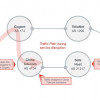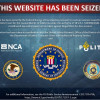U.S. could close Gates on hackers, terrorists
Here's a chance for Bill Gates to redeem himself politically.
Our nation is under attack, and our computer systems are undeniably vulnerable - a House Science Committee hearing made that all too clear last week. But there's no major government funding source for computer security research, and with so little money out there, few academics focus on the subject.
There's no question the problem is immense. But it's one that Gates could help solve. And solve it soon we must.
Cyber terrorists could find it relatively easy to subvert critical control systems, experts warn. To a large degree, our nation's businesses and government agencies rely on such ``Maginot line'' forms of defense as firewalls that are notoriously porous.
``It's a notion that there's bad stuff out there and good stuff in here and we want to protect what's in here against the bad guys out there. That model doesn't work,'' said William A. Wulf, president of the National Academy of Engineering.
All too often, Wulf said, hackers penetrate computer security screens because of underlying design flaws. Such flaws can be quickly exploited by hackers - and they are working hard out there.
Robert Weaver, the Secret Service agent who runs the New York Electronic Crimes Task Force, told the panel that since his operation began in 1995, more than 800 people have been charged involving cyber crimes that have resulted in $525 million in losses. The experts say U.S. computer systems run amid a constant background of cyber attacks. The wonder is why the bad guys aren't more successful.
Even our military could be vulnerable. Four years ago, Wulf said, a small hacker group brought a joint-services exercise to a halt largely by using simple denial-of-service attacks.
Despite the great need for better cyber security, there are relatively few students choosing that specialty. Eugene Spafford, a Purdue University professor speaking for the industry's Association for Computing Machinery, said only 23 computer security Ph.D.s were granted in the last three years by 24 top universities.
A big reason, Spafford said, was the lack of long-term dedicated research funding. Gates could make a big difference here. And by doing so, the principal character behind Microsoft's antitrust case could go a long way toward remaking his public image.
Gates, worth about $50 billion, could flip $1 billion into a nonprofit institute set up to fund and encourage computer security research. Resources of that magnitude could ensure a steady stream of new research talent and interest. And by keeping the government at arm's length, lingering public fears of intrusions on computer privacy could be eased.
But that's not all that's needed.
Experts say the Digital Millennium Copyright Act makes some needed research illegal. And pending bills would make matters even worse, they warn. Congress can and should do something about both, and fast.
Meanwhile, Bill Gates should seize the opportunity to step up and make a lasting difference.









































































